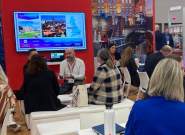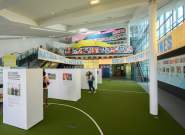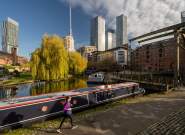In 2016, this major event of European science was hosted in Manchester, the birthplace of the Industrial Revolution, a city whose ideas have always challenged the established order. The motto ‘Science as Revolution’ was an invitation for breakthrough ideas to continue scientific revolutions and encourage focus on past, present and future path-breaking science.
The main conference days of ESOF ran between the 24-27 July 2016 and …
- Showcased the latest advances in science.
- Promoted dialogue on the role of science and technology in public policy.
- Stimulated and provoke public interest and engagement, excitement and debate about science and technology.
- Engaged the European science community with global partners and perspectives.
- Interrogated the interplay between science and society and inspire public debate on science-related societal change.
ESOF2016 was an excellent opportunity to discuss the socio-cultural and economic implications and impacts of scientific revolutions from regional, national, European and global perspectives. This international perspective is particularly significant since, in the face of global challenges and the internationalisation of trade and political governance, science is increasingly considered an international collaborative endeavour; a feature that the programme addressed.
Manchester Central, a building in the centre of Manchester and once one of Manchester’s main railway stations, was the home of ESOF 2016 and its exhibition. Close to all local amenities, Manchester Central was easily accessible for those looking to learn more about science.
ESOF2016 welcomed speakers from the very top stratum of the worlds of science, government and business and delegates from 80 countries. The forum was able to showcase the best of UK and European science and to tackle head on many of the key policy challenges facing us in topics as diverse as antimicrobial resistance, doping in sport, women in science, the implications of gene-editing, gaining economic value from research and the consequences of Brexit.
Equally gratifying was the engagement of 3,600 delegates at the forum and the 40,000 citizens who took part in the Science in the City festival. For several days you could not arrive or depart from the city or walk through its main streets without being infused with the enthusiasm for science that gripped us all and which we shared with our visitors and, via our media colleagues, with a global audience.
The exhibition brought together leading science companies, business people and products as well as offering space to network and take part in interactive activities and attend talks. With around 100 exhibitors during the ESOF there was plenty to explore and discover; from the latest products and advancements in technology, to exciting exhibits such as Nikki Lauda’s McClaren.
Whilst the themes for ESOF 2016 had to be sufficiently broad to appeal to the interests of as wide and diverse audience as possible (and reflected the main interest groups in previous ESOF conferences), they were also influenced by a number of areas of research which held a particular resonance with Manchester. Hence, ‘Material dimensions’ recognised Manchester’s role as the ‘home of graphene’; ‘Far frontiers’ picked up on the decision to base the HQ of the SKA at Jodrell Bank, located to the southwest of the city; while ‘Turing’s legacy – data and the human brain’ reflected the pioneering work undertaken by Alan Turing when a researcher in Manchester.
The final set of nine themes was:
- Bio-revolution
- Far frontiers
- Healthy populations
- Living in the future
- Material dimensions
- Science for policy and policy for science
- Science in our cultures
- Sustaining the environment:
- Turing’s legacy – data and the human brain
Each theme was elaborated with a series of sub-topics.
In order to provide additional coherence to the overall programme, a number of cross-cutting themes were also proposed. These were stimulated by the general question of ‘how to foster excellence in science as an agent for positive and transformative change?’
The cross-cutting themes were:
- Fostering breakthrough science;
- Ensuring responsible research and innovation, aligned with the values, needs and expectations of society;
- Harnessing science and technology to growth, employment, economic success and personal well-being;
- Radical approaches to grand societal challenges – health, food, water, energy, climate, security, and creativity and innovation;
- Engaging the public and inspiring the next generation of researchers.








